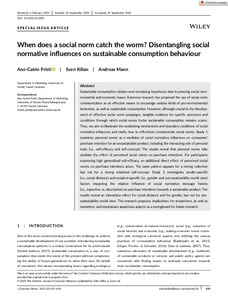| dc.date.accessioned | 2021-07-26T12:44:20Z | |
| dc.date.available | 2021-07-26T12:44:20Z | |
| dc.date.issued | 2020-11-08 | |
| dc.identifier | doi:10.17170/kobra-202107204381 | |
| dc.identifier.uri | http://hdl.handle.net/123456789/13036 | |
| dc.description.sponsorship | Gefördert im Rahmen des Projekts DEAL | ger |
| dc.language.iso | eng | eng |
| dc.rights | Namensnennung 4.0 International | * |
| dc.rights.uri | http://creativecommons.org/licenses/by/4.0/ | * |
| dc.subject.ddc | 330 | |
| dc.title | When does a social norm catch the worm? Disentangling social normative influences on sustainable consumption behaviour | eng |
| dc.type | Aufsatz | |
| dcterms.abstract | Sustainable consumption obtains ever-increasing importance due to pressing social, environmental and economic issues. Extensive research has proposed the use of social norm communication as an effective means to encourage various kinds of pro-environmental behaviour, as well as sustainable consumption. However, although crucial to the development of effective social norm campaigns, tangible evidence for specific processes and conditions through which social norms foster sustainable consumption remains scarce. Thus, we aim to illuminate the underlying mechanisms and boundary conditions of social normative influences and clarify how to effectively communicate social norms. Study 1 examines personal norms as a mediator of social normative influences on consumers' purchase intention for an unsustainable product, including the interacting role of personal traits (i.e., self-efficacy and self-concept). The results reveal that personal norms fully mediate the effect of perceived social norms on purchase intentions. For participants expressing high generalized self-efficacy, an additional direct effect of perceived social norms on purchase intentions arises. The same pattern appears for a strong collective but not for a strong relational self-concept. Study 2 investigates sender-specific (i.e., social distance) and recipient-specific (i.e., gender and pro-sustainability world view) factors impacting the relative influence of social normative message frames (i.e., injunctive vs. descriptive) on purchase intentions towards a sustainable product. The results reveal an interaction effect for social distance and for gender, but not for pro-sustainability world view. This research proposes implications for researchers, as well as marketers, and emphasizes auspicious aspects as a springboard for future research. | eng |
| dcterms.accessRights | open access | |
| dcterms.creator | Pristl, Ann-Catrin Cara | |
| dcterms.creator | Kilian, Sven | |
| dcterms.creator | Mann, Andreas | |
| dc.relation.doi | doi:10.1002/cb.1890 | |
| dc.subject.swd | Verbraucherverhalten | ger |
| dc.subject.swd | Nachhaltigkeit | ger |
| dc.subject.swd | Sozialverhalten | ger |
| dc.subject.swd | Soziale Norm | ger |
| dc.type.version | publishedVersion | |
| dcterms.source.identifier | eissn:1479-1838 | |
| dcterms.source.issue | Issue 3 | |
| dcterms.source.journal | Journal of Consumer Behaviour | eng |
| dcterms.source.pageinfo | 635-654 | |
| dcterms.source.volume | Volume 20 | |
| kup.iskup | false | |


